Reading Time: 4 Min
Rhinoplasty splints or nose splints are two silicone or aluminum devices placed either inside or outside the patient’s nose after a nose surgery. Their functionality is to help patient’s nose maintain its new shape. Regardless of being internal or external, applying nose splints is one of the important steps of post-operative cares which speeds up the recovery process.
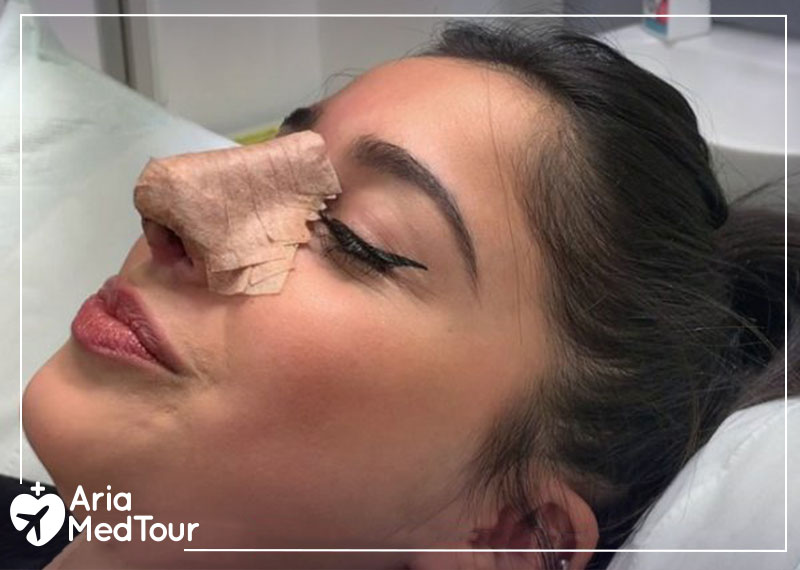
Nasal splints are integral part of a rhinoplasty!
What is the difference between internal and external nasal splint types?
There are two types of nose splints. Depending on the nasal surgery, internal or external splints are recommended by the doctor. An internal splint is placed into the nasal cavities. An external splint, which is more common, is attached to the nose by a tape.
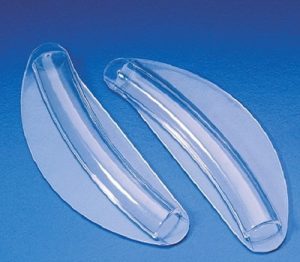
Internal nose splints
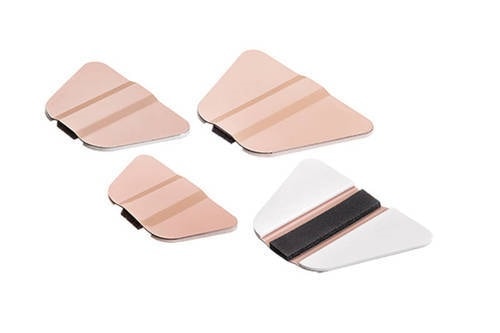
external nose splints
What surgeries need nose splints?
There are two main nasal surgeries that require nose splints, rhinoplasty and septoplasty. Rhinoplasty is a nasal surgery which is concerned with either beauty or functionality (or both) of a nose. For this type of surgery, both internal and external splints are applied. Septoplasty is the correction of the cartilage between two nasal cavities, named nasal septum. Internal splints are needed after septoplasty.
Nose Job Packages
Surgery + Hotel + Visa
Transfer + Interpreter
Why are nose splints used?
After nose surgeries, the shape and size of septum, nose, or nostrils change. As they need a special time to maintain their new shape and size, nasal splints are used to protect nose’s new shape and immobilize bones. Although you should be fully aware of the fragility of your nose after the surgery, in case of an accident, splints would protect your nose from possible injuries. They would hold nose’s bones in place to prevent possible changes to the shape of the nose.
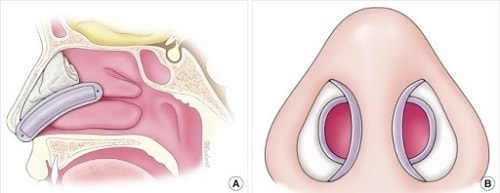
What are the benefits of nose splints?
- They prevent the development of hematomas. Internal splints keep a distance between nose skin and its bones at the same time. This distance leaves no room for the pockets of blood, which are called hematomas.
- They help you breathe better after the surgery by loosening the nasal cavities and opening the airway.
- They control bleeding.
- They minimize swelling.
- They cause no pain.
- They are temporary and removable.
When should I have my nose splints removed?
Depending on the surgery, internal and external splints’ duration varies. Normal duration for external splints is 2 weeks and you can have an internal nasal splint removal in 3 to 7 days.
How to take care of your nose splints
As using nasal splints is itself a step in rhinoplasty post-operative cares, there are no specific requirements for it. For having a better and easier experience and avoiding crustiness, it is better for you to utilize a saline nasal spray in the nostrils. Be gentle with your nose until it is the right time to visit your doctor and remove your nose splints.

How to take care of your nose splints?
What are common side effects and risks of nose splints?
Nasal splints are not risky. There are a few complications as mentioned below:
- Discomfort
- They may become coated
- They may become loose
- Their removal may cause a strange feeling, but there would be no pain.
You May Like to See Before & After Photos of Rhinoplasty
You May Like to See Before & After Photos of Rhinoplasty
Nose splints used in Iran
As cosmetic surgeries are popular and trending among Iranians, there are special professionals performing nose surgeries in this country. There are well-equipped clinics all around Iran in different cities, like Tehran, Isfahan, Shiraz, Tabriz, Mashhad, and Kish Island. As beauty is truly cherished in Iran, nose surgeries are performed with special cares and precision. Therefore, Iranian rhinoplasty surgeon use the best nose splint brands that are of the highest quality.
AriaMedTour helps you find your desired nose surgery option by planning your travel and introducing clinics and surgeons. Please contact us so that we can help you with your medical treatment.
Share this article:
Related Articles
Feel free to express your opinions or ask your questions regarding the article

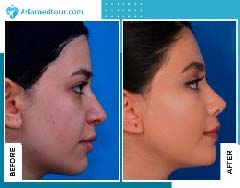

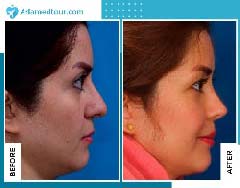

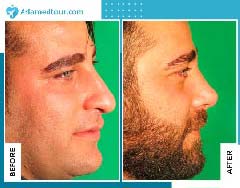

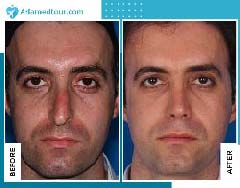
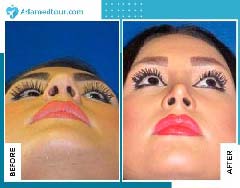
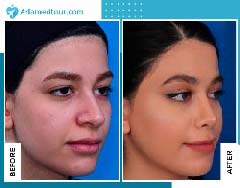
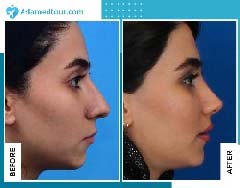




on tuesday, i had my nose surgery performed to reshape my nose. now it’s thursday and i already took my splint off. my skin is oily and the splint could be slid around easily, so i took it off. now i have a question. will my nose get hurt or damaged because of taking my splint off early?
Dear Nastassia,
It surely wasn’t a good idea to remove the splint yourself without any consultation. It would have been better to contact your surgeon before taking it off.
As you may know, the two most prominent functions of the splint are to help control swelling and to protect the bones from any blows or pressure after the surgery when they are stabilizing.
Just the act of removing the splint, if done carelessly and at an early stage, could compromise the shape of the nose and may result in additional swelling or lengthen its resolution.
If you are careful and follow post-op restrictions, it’s probably ok. However, we suggest you contact your surgeon and get a new splint.
Hi i had a nose job 3 days ago and i am searching to know when i should take the splints off. can you please help me
Hi dear Alina,
As mentioned in the text above, nasal splints’ duration varies depending on the surgery.
Splints are usually removed about two weeks after the surgery. However internal splints may be removed 3 to 5 days after surgery.
does it hurt to remove my nose splint after the surgery?
Dear Alexandra,
Removing nasal splints usually doesn’t cause discomfort. Some patients may experience slight discomfort when removing splints due to stretched skin.
Of course, many patients get rid of this feeling after the splint is removed. The presence of splints may cause mild nasal congestion.
It is very helpful to use saline nasal spray immediately after your surgery to reduce scaling and irritation when the splints (nasal plaster) are removed.
Should i use an internal nose splint or an external one? and what is their difference exactly?
Dear Majida,
An internal splint is placed into the nasal cavities. They are commonly used after a septoplasty.
On the other hand, external splints, which are more common, are attached to the nose by a tape.
External splints are used to maintain the new shape of the nose when the nose is vulnerable and need more protection. This type of splint is more common than the internal type.
i am going to do nose surgery next week. i found a good doctor near me and i am reading articles to be informed about rhinoplasty aftercare. this was a good article. i have a question now. what if the nose splint loosens? then what should i do?
Dear Evgenia,
The nasal splints rarely loosen during the healing period. Anyway, if it happened to you or you notice any symptoms that concern you, contact your surgeon, please.
However, usually when these splints loosen, it is approximately the time as they should be removed.
thanks doctor for the article. what should i do before removing the splint from my nose after the surgery?
Dear Maria,
On the day set to remove the splint from your nose, you must take a shower a few hours before to soak and loosen the splint;
Please note that you should not touch the nose splint under any circumstances.
Just take a shower and wash your head and body as usual.
The purpose of bathing before removing the splint is for the surgeon to easily remove it from your nose without causing pain.
I have just had a nose job two weeks ago. I took my nose splint off 2 days ago. The trace of the splint remained on the upper part of my nose, like the trace of glasses on the nose bridge.
what should i do now? will they disappear themselves?
Dear Rami,
If this is due to the pressure of the splint, it is not a problem and it will be fixed soon.
I have already got my nose job surgery done last Monday, and i took off my nose splint yesterday. i just wanted to know whether or not i can go to the pool without swimming and just walking there. is it ok to do so?
Dear Elvin,
There is no problem, you can walk in the water. But if you want to swim, it must be at lesat 1 month after the surgery. Note that you shouldn’t dive in the water, not less than 6 months after the operation.
I had Rhinoplasty. And when I went to my surgeon to remove the splint, one came out and he could not remove the other. He couldn’t see it so told me to come back so we don’t further traumatize the nose.
Then I asked him if I see it if I can remove it myself and how I can do that safely. And he told me that I could. But after cleaning up my nose and using a flashlight I didn’t find one.
Breathing on the left side is much better than on the right side. And cosmetically, my nose looks bulbous. And the rest right side is bigger than the left side. Will this be resolved with time? Or is my nose affected by the lack of splint? I’m very upset that they did not put a splint onnl the right side. I don’t understand how that could’ve happened…..
Hello. I recommend seeing an ENT surgeon to check out whether there is nasal splint in one side of your nose or not.
Your surgeon can remove it with special forceps and light.
If you suspect that the nose splint may still be present on one side of your nose, a paranasal CT-SCAN may be needed.
In the case of unilateral swelling of your nose, my advice is to wait at least 1 year from the date of your surgery. Swelling (bilateral or unilateral) is very normal in the first months of the surgery and will resolve over time.
The final result of your nose surgery can actually be seen about a year after the surgery.
After my septoplasty, I’ve noticed that the internal splints aren’t inserted equally, on the pre-op deviated side the splints are inserted deeper than the other side that had wide space pre-op… is this normal? it’s my 6th day and am feeling that the splint that isn’t deep is getting loose
6 days after septoplasty is not a good time to judge the result of the surgery.
Maybe this is your personal feeling.
You’d better wait at least 3 months after your surgery to see the final results.
However, we recommend that you consult your surgeon and ask for his/her opinion.
I have had a the nasal splint for 1 month and will be remover in 15 days as my doctor is out of town. I feel lots of discomfort. Is this OK to have it for such a long time?
Hi Victoria,
Thank you for asking.
The nasal splint can remain in place for up to 30 days and even 2 months for more invasive facial and nasal surgeries. So it’s not a big issue and you can get it removed as soon as your doctor comes back.
I had my op a week ago today and my splint/ cast thing was starting to come off and I did take it off and now I’m panicking I was meant to have it removed in a day anyway but will it be okay
Hi Amy,
Thank you for asking.
As the splint has been in place for a week, it’s now fine to get it removed, so its removal does not affect your recovery now. However, contact your doctor and consult them about how to tape your nose at home. Here is our video about how to tape the nose after rhinoplasty.
I just had septoplasty last week and I’m still getting used to the splints in nose. Honestly, I wasn’t expecting them to feel this uncomfortable. Can someone explain what are nose splints exactly and how long it usually takes before nasal splint removal?
Hi Lily! Great question. Nose splints (also called nasal splints) are small supportive devices placed inside the nose to keep the septum stable while it heals. Most patients have internal nasal splint removal around 5–7 days after surgery, depending on their surgeon’s recommendation. The discomfort is normal and usually improves quickly after nose splint removal.
As an ENT specialist, I often remind my patients that septoplasty splints or nose stents are essential for maintaining structure during recovery. Many patients don’t understand what are nose splints used for, which can make them anxious before the procedure.
Thank you, Dr. Hale. You’re absolutely right — understanding the purpose of nose splints helps reduce anxiety. We always explain to patients that nose splints before and after images show how effective they are in keeping the septum straight, reducing bleeding, and preventing post-op collapse. Whether using nose stents or silicone splints, they all support proper healing after nasal surgeries.
I’m considering rhinoplasty and keep hearing about nose splints being placed afterward. Do all nose surgeries require a nose splint, or are they only used in certain cases like septoplasty?
Hi Jason! Not every procedure needs nasal splints, but many rhinoplasty and septoplasty patients do receive them. They help stabilize the nasal structure, reduce swelling, and support cartilage shaping. Your surgeon will decide whether nose splints are necessary based on the complexity of your surgery.
I’m a little nervous about my upcoming appointment because I’ve read that nose splint removal can be uncomfortable. Is internal nasal splint removal painful?
Hi Hannah! Most patients describe nose splint removal as strange but not painful — more like a quick pressure release. The process of internal nasal splint removal usually takes less than a minute. Once removed, breathing almost always feels easier, and swelling can improve rapidly.
Can you be more specific about the content of your article? After reading it, I still have some doubts. Hope you can help me.
dear…We have a lot of information on rhinoplasty, different methods and techniques on our site. Please check out the rest of the article…thanks